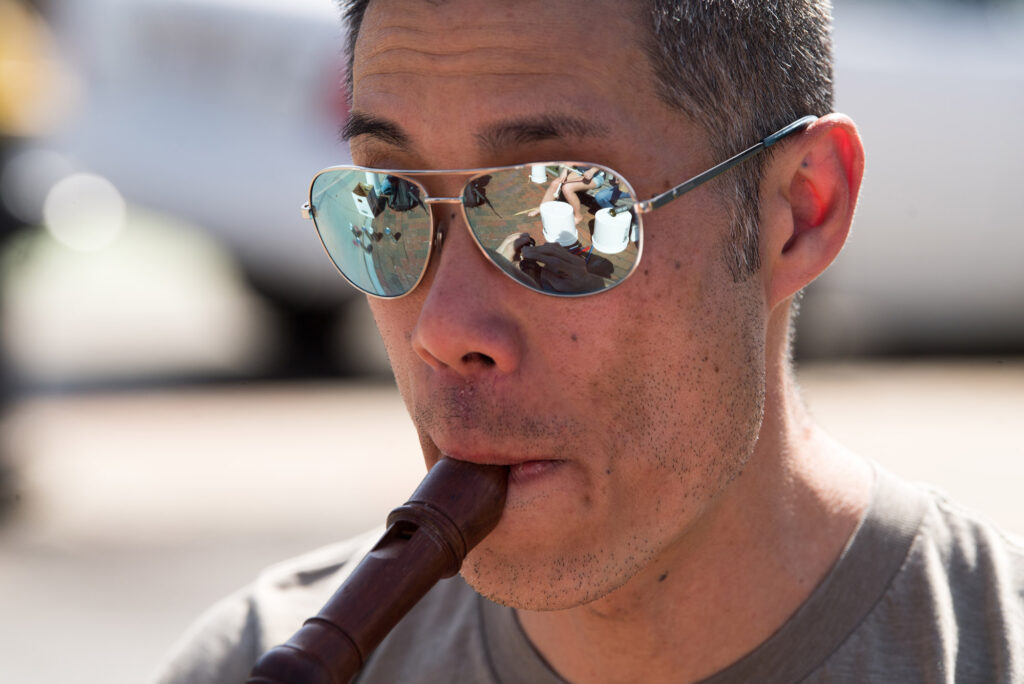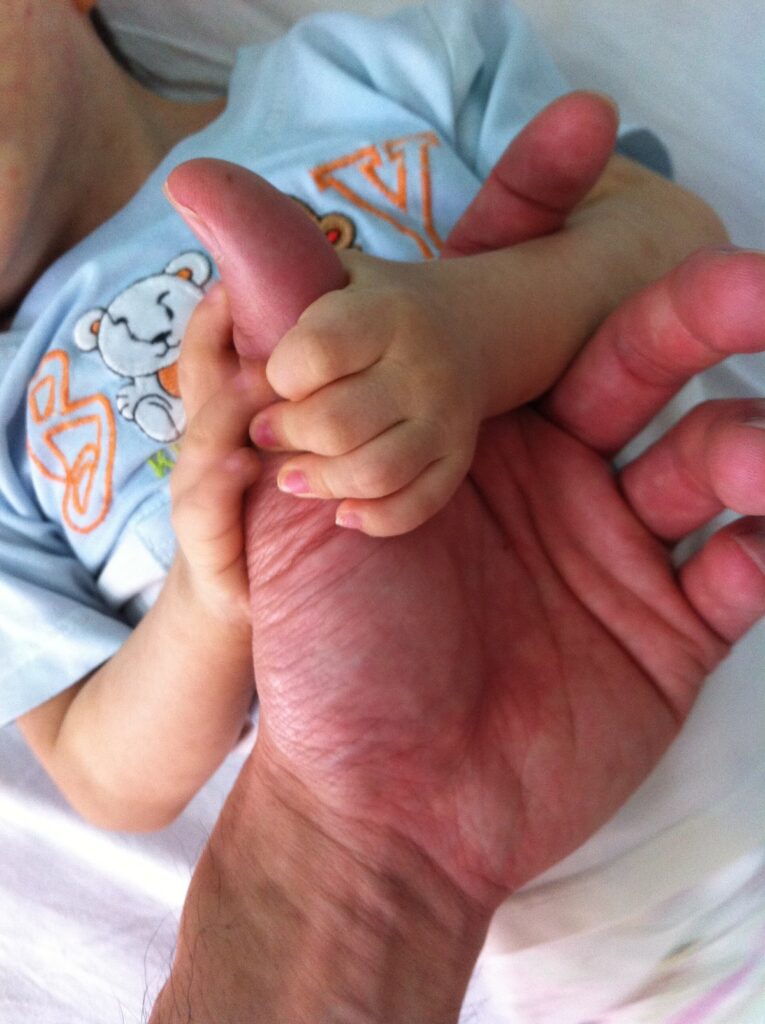Kinh Vu’s Journey from Vietnam Orphan to BU Music Professor
In the video above, Kinh Vu, a College of Fine Arts assistant professor of music, talks about the power of music education and shares his experience making music in an orphanage in his natve Vietnam. Photo by Cydney Scott
Kinh Vu’s Journey from Vietnam Orphan to BU Music Professor
A new book examines what music can do for displaced persons, which this CFA faculty member knows firsthand
Kinh Vu was an infant when he was abandoned in front of An Lạc Orphanage in Saigon, now Ho Chi Minh City. Like many of the children who landed there, he was given the surname of the woman who ran it, Madam Vũ Thị Ngải.
“This is the gate where I was left outside the orphanage,” Vu says, showing a snapshot of an empty sidewalk and the closed gate. The mundane image belies its gravity for Vu, a College of Fine Arts assistant professor of music. “I have some of that wall, actually, in my office.”
Soon after he arrived at the orphanage, he was flown to the United States with other orphans, in April 1975, just ahead of the fall of South Vietnam, an airlift so novel that it became the subject of a made-for-TV movie (The Children of An Lac, 1980). He was adopted by a California family, and he’s lived an all-American life. A gifted musician, Vu played euphonium, tuba, and string bass in his high school and college orchestras and marching bands. Later he taught music in public schools for more than a decade before moving to higher education.
In 2014, he came to the CFA School of Music, where he is also dissertation progress coordinator. His passion for music, and for life, is such that as a faculty-in-residence at Kilachand Hall, he’s known to host student gatherings in his apartment and start up a drum circle or pull out his ukelele to bring people together.
The forthcoming anthology My Body Was Left on the Street: Music Education and Displacement (Sense Publishers, 2020), which Vu coedited with André de Quadros, a CFA professor of music and former School of Music director, takes its title from something de Quadros heard him say. The book is but one example of the way Vu’s life experience and love of music have braided together with his scholarship and pedagogy.
This weekend the School of Music hosts the annual Conversation on Music Education, which brings together students, alumni, faculty, and outside collaborators to dig deep into their role in supporting change through music. Vu will host the Forum on Poverty and Displacement, focusing on circumstances where music education can make a prosocial impact, from a choir of people experiencing homelessness in San Diego to an Undergraduate Research Opportunities Program (UROP) project bringing music to a children’s care center in India.
The topic could not be more meaningful, or personal, to Vu. Through the years, his precarious beginnings in Ho Chi Minh City were always there in the background of his life, a soft, steady drumbeat. Eventually he had to go back.
Finding his way in music
“I fell in love with capital-M Music playing Beethoven’s overture to Fidelio,” Vu says. “I was playing string bass in a regional youth orchestra, and that was the first piece of music I fell in love with.” And it was a human connection that made the difference.
“I had made music all my life, but I knew my schoolteachers didn’t really like people, they liked music,” he says. “Mr. Straiton, who directed the regional youth orchestra, he liked people, and that was such a different thing for me. I don’t think it was Beethoven or Mozart or Copland, I think it was Mr. Walter Straiton. He liked us a lot.
“I hadn’t seen him since 1993, when I graduated high school. I presented at a Penn music education conference about a year ago and there he was. I was instantly in tears. I tell my students about this guy all the time. I don’t care what kind of music you program in your schools or your community centers or your churches, but the learners will get nothing out of it if they know you don’t care about them. They see through you.
“The little children really see through you. They have superpowers to see genuine interaction with adults.”
He really made it about the joy, the joy of these children who didn’t have a lot—some couldn’t walk or talk, but when he played for them they could at least share a smile.
Vu went on to a career teaching music in public schools, where he also was marching band director, jazz band coach—whatever was needed. He hosted student teachers in his Connecticut classroom, and one of their professors told him he should get a PhD, which eventually led him to the CFA faculty. Now he teaches music-ed courses like Secondary General Music Methods and Music Education Lab, is a BU Bands staff instructor, and teaches the band’s leadership, as well as coaching staff members in teaching and learning.
“If you look at ethnomusicology, they talk about communities of singers or music makers. There is absolutely a social bond, a cohesion that occurs,” he says, when you make music together. “When I was a high school band director, I saw how powerful playing or singing in ensembles was for young people. For some of them, the music suite became a refuge of sorts.”
Vu’s faculty post also offers an opportunity for a deeper examination of music’s effect on people in need, especially children.
“I’ve had more students approach me in the last year about my own research trajectory around displacement,” Vu says, “around my own abandonment on the streets and how that me-search affects my research.”

He has a variety of research projects, most notably now in Cambodia, where music teachers from community centers had been helping women write lyrics about their lives. “Some of that is protest, Pete Seeger-esque,” he says. “About a year ago some music educators were arrested for participating in this work, for helping people open their eyes and voice their concerns. These women are in their 50s and 60s, and they marched down to the police precinct and got these teachers out of prison. But they are resisting the arts education effort now, because they are afraid of being arrested themselves.”
He also works closely with students on their projects, including one that found him on a trip to a child care center in Rishikesh, India, this past summer, to bring a variety of enrichment programs to that underfunded facility. Music education major Hannah Hooven (CFA’21) was one of the organizers of that project. Last year Hooven had enlisted his support for the Boston After-School Music (BAM) program she and two other students created at a Roxbury school that had no money for an instrumental music program.
Issues close to his heart
They Left My Body on the Street is another way to grapple with the role of a music teacher in the world, whether in Brookline or Dorchester, in Texas or somewhere across the sea. Vu and de Quadros and their authors investigate the interaction between music education and forced human migration, or displacement, and its effects on refugees, asylum seekers, and others.
“André and I are looking at displacement very, very broadly,” Vu says. “When you think about it deeply, it includes people experiencing homelessness, people in the LGBTQ community who have been outed by, say, their church community and had no choice but to leave the place they called home.
“Is there an opportunity for Afghans to sing their own songs in the context of a Swedish choir, or for Ghanaian women to sing their own songs in the context of a women’s refugee choir in Maine? Is this helping people make sense of their world?” he asks.
Even if they are not singing their own songs, language learning, and especially socialization, are often benefits. But at the same time, a sort of cultural colonization and religious indoctrination could also take place. The book tries to sort it all out with academic rigor, but the issues are close to Vu’s heart.
“You know his story,” de Quadros says. “In some ways he has been discovering himself more and more in the last few years.”
Vu first went back to Vietnam in 2011. “As we were coming in to land, I was a puddle on the floor of that 737,” he says.

The sights and sounds and smells, the sense that this, too, was home, were overwhelming. Leaving was even harder, and Vu has returned some 30 times in the eight years since. He went back to that gate where he was abandoned and the orphanage beyond it, now used as housing. But he still knows little about his infancy, save for a few pieces of paperwork he obtained after long searching.
Each time he goes back, he has volunteered at another orphanage, near the Ho Chi Minh City airport, returning each year to make music for and with the children, some bedridden, and their caregivers.
“I make up most of the music,” he says, flipping through pictures. “I take recorders with me and play music at their bedside. I also bring egg shakers and some scarves to wave around and dance. It is musical play with infants through young children.” (That is not the same as music therapy, he emphasizes.)
Hooven first met Vu a couple of years ago at the Conversation on Music Education, when he spoke about his return to Vietnam. “It was a very emotional kind of talk, and he showed videos of work with the kids there, and coming away from it I thought, wow, this is an amazing place to be studying music education,” she says. “He really made it about the joy, the joy of these children who didn’t have a lot—some couldn’t walk or talk, but when he played for them they could at least share a smile, and that’s enough to show that they could enjoy it and derive some comfort from it.”
That’s what Hooven wanted to bring to the BAM project, so that children who don’t have the resources in their schools for a music program—and who may be going through some difficult times—could find moments of joy.
Vu notes there’s more to teaching music than just playing and singing. “If you want to make music in a community, a lot of times it means changing diapers, changing feeding tubes, laying with children on the floor and just laughing with them.
“Whether it’s the children in a high school wind ensemble or the children in a care center in Ho Chi Minh City,” he says, “the children are just like any other children—they want to know that they are loved and cared for.”
Comments & Discussion
Boston University moderates comments to facilitate an informed, substantive, civil conversation. Abusive, profane, self-promotional, misleading, incoherent or off-topic comments will be rejected. Moderators are staffed during regular business hours (EST) and can only accept comments written in English. Statistics or facts must include a citation or a link to the citation.